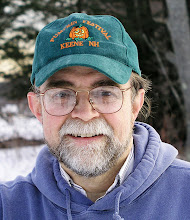 There is an endlessly ongoing debate about the routine use of filters to protect valuable lenses from scratches and smudges. I have always felt that my lenses are my most precious photographic jewels, much more valuable than my latest camera.. With the rapid pace of development in digital technology, it seems these days that I'm lusting for a new camera about every couple years, but great glass should last for a lifetime. When I buy a new lens, the very next thing that I do is to slap on a UV or clear filter to protect my investment and I get sweaty palms every time I change that little piece of glass. I have heard all the arguments against this practice and they are quite reasonable. "What sense does it make to place a cheap piece of glass in front of a $1,000+ collection of marvelously tuned and coated optics". "The extra layer of glass provides more opportunities for reflections and flare. softening the images". "A lens cap can provide all the protection you need". All good arguments, although I should point out that quality filters are hardly cheap any more. On my side I can only offer what happened to me earlier this week.
There is an endlessly ongoing debate about the routine use of filters to protect valuable lenses from scratches and smudges. I have always felt that my lenses are my most precious photographic jewels, much more valuable than my latest camera.. With the rapid pace of development in digital technology, it seems these days that I'm lusting for a new camera about every couple years, but great glass should last for a lifetime. When I buy a new lens, the very next thing that I do is to slap on a UV or clear filter to protect my investment and I get sweaty palms every time I change that little piece of glass. I have heard all the arguments against this practice and they are quite reasonable. "What sense does it make to place a cheap piece of glass in front of a $1,000+ collection of marvelously tuned and coated optics". "The extra layer of glass provides more opportunities for reflections and flare. softening the images". "A lens cap can provide all the protection you need". All good arguments, although I should point out that quality filters are hardly cheap any more. On my side I can only offer what happened to me earlier this week.The weather has been oppressively hot the last few days with temperatures smoldering into the high 90's, worsened by suffocating humidity. One of the only advantages of this weather is that, as the afternoons progress, we are often treated to towering clouds building into impressive thunderheads. A couple of days ago I went out in the evening looking for opportunities to catch the golden light on these castles in the sky. The sky above was clear and deep blue, but closer to ground the hazy air had an almost iridescent glow that made the heat palpable. I set up across a field from a nice farm house in Hinsdale NH and waited for the towering clouds to move across the scene. At one point I ran back to the car to get my telephoto lens. My heart
 dropped when I pulled the lens from my case. Apparently a wayward AA battery had escaped its container ending up underneath my beloved 100-400mm zoom. The lens cap had come loose allowing the battery to sadistically grind into the lens. As can be seen the polarizing filter that I had left in place was demolished. Holding my breath as I removed the filter I found only a little glass dust from the filter, which was easily blown and brushed away. That polarizer gave its life to protect the lens and I was never so thrilled to loose a filter. It was even the cheapest of my polarizers.
dropped when I pulled the lens from my case. Apparently a wayward AA battery had escaped its container ending up underneath my beloved 100-400mm zoom. The lens cap had come loose allowing the battery to sadistically grind into the lens. As can be seen the polarizing filter that I had left in place was demolished. Holding my breath as I removed the filter I found only a little glass dust from the filter, which was easily blown and brushed away. That polarizer gave its life to protect the lens and I was never so thrilled to loose a filter. It was even the cheapest of my polarizers.I still understand the arguments against keeping filters on lenses and I do remove them in special situations such as when shooting into the sun. I always get the best filters I can afford, but after this week I feel even more strongly that I should continue to protect my precious photographic jewels.

If you are looking for quality filters you can't go wrong by visiting my friends and neighbors at the Filter Connection, in Gilsum New Hampshire.

Long lenses need the best quality filter for the best flatness of field performance.
ReplyDeleteThanks for the mention, the polarizer did it's second job and protected that "white" lens.
ReplyDeleteThe 2nd farm image has a look of image from a postcard, the pastels colors, so pleasant to enjoy
I had shivers over my body when i saw the pic...quite scary! :)
ReplyDelete